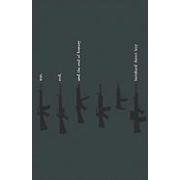The author opens with an examination of how the “story of Israel” has gone from core reality (a place so barren it makes the Congo look good, Palestinians kicked off their land after Israeli terrorists expelled the British occupying power) to a “land of milk and honey” with deserts made prosperous by Israeli industry–he neglects to mention that Israeli agriculture contributes 3% of the GDP while using 50% of the water, and that most of the water is being stolen by Israeli from underneath land outside Israeli territory.
From an “information operations” perspective, this is a really fascinating and well-told story of how Israel created several myths that sold not only in the USA but all over the world. I write in the margin, “Israel is the ultimate Potemkin village.” The author is also good at exploring the early signs that these myths are being exploded, the world is catching on, and US support for Israel may be on the verge (within five to seven years) of being withdrawn.
As he is both an American Jew and a Pulitzer-prize winning journalist, I give this author special marks for combining a loyalty to his faith with a loyalty to the truth. The Islamic-oriented review from New Jersey adds a frame of reference I am not qualified to comment on, but I recognize it as valuable. Among the most important observations the author makes early on are these: 1) when Israel became an occupying power and got into the business of assassination as a routine method, censorship of Jews by Jews became commonplace–this was the “new aspect” of the Israeli regime. 2) At the same time, in America, self-censorship and popular protest of Jewish readers against Jewish writers critical of Israel, became more marked. The Jews of America–at least the vocal ones cited by the author–simply do not want to hear the truth–they are blindly bonded to the myths.
Sharon is slammed in this book many times over. The author credits Sharon with being the original Israeli army sponsor for assignations, and the several pages on Israeli assassination history and policy are alone worth the price of the book (pages 39-51). Sharon is recalled in the book by General Pundak as “a disgraceful officer–a liar, cheater, a swindler and suck-up, a killer and a coward.” I believe this–sounds like Chalabi and Arafat–the three were made for each other and disgrace us all.
The author explores a second crime against humanity characteristic of the Israeli bureaucracy: collective punishment. He builds a bridge from this–a policy that is explicitly forbidden by the Geneva Convention–to Israel's collective loss of shame and loss of emotional commitment to the “all for one and one for all” attitude that marked the early years. Now it is everyone for themselves, never mind what the authorities do “in our name.”
The chapter on why Palestinians do not have a state is full of interesting observations, including the author's view that the US audience simply does not know the Palestinian side of the story; that the occupation is costing 18% of Israel's GDP (just 1% over the 17% of the Israeli government budget that we provide them out of the US taxpayer's pocket–two different stacks of money, but the comparison needs to be made); and that the isolation of Gaza, and the honeycomb nature of the walls and barriers, are so grotesque as to be both Kafkaesque and Warsaw ghettoish–the victim has indeed become the perpetrator, and Israel cannot be seen, in its treatment of the Palestinians, as anything other than fascist and abusive.
Having torn apart the Israeli side, the author then moves to the Palestinian side, and two major ideas stay with me: first, the concept of honor so deeply rooted in Arab culture, an honor that the Israeli's are attacking with every humility they can impose; and second, the utter contemptible corruption of Arafat and the Palestinian security authorities.
The book moves to a conclusion with a retrospective look at the bargain with the devil made by the Israeli security authorities very early on, when they accepted a dictatorship of the government from the zealot orthodox rabbis. He also explores the various “tribes” now within Israel, concluding that two thirds of the “new Jews” are not Jews at all, but simply Russian and other opportunists who have succumbed to the global covert and overt action operations of the Jewish state seeking to bring in more bodies as part of a demographic campaign plan.
The author can be shocking. He makes a case that is the Jews of Israel who bear the bulk of the responsibility for starting “the hate” and that it is the Israeli government that originally funded Hamas as an alternative to Arafat–an unfortunate reminder of US government funding for Islamic fighters in Afghanistan who have now turned on us.
The author's note and acknowledgements at the end of the book are worth reading carefully, and includes a list of other books on this topic.
I expect a lot of negative votes on this review–that is the price we pay for offering honest opinions in a forum where a deliberate Jewish bloc attacks those like the author–and this reviewer–for seeking to move a balanced dialog forward. Amazon has new algorithms for detecting “hate votes” and “organized negative votes,” we shall see if those work here.











